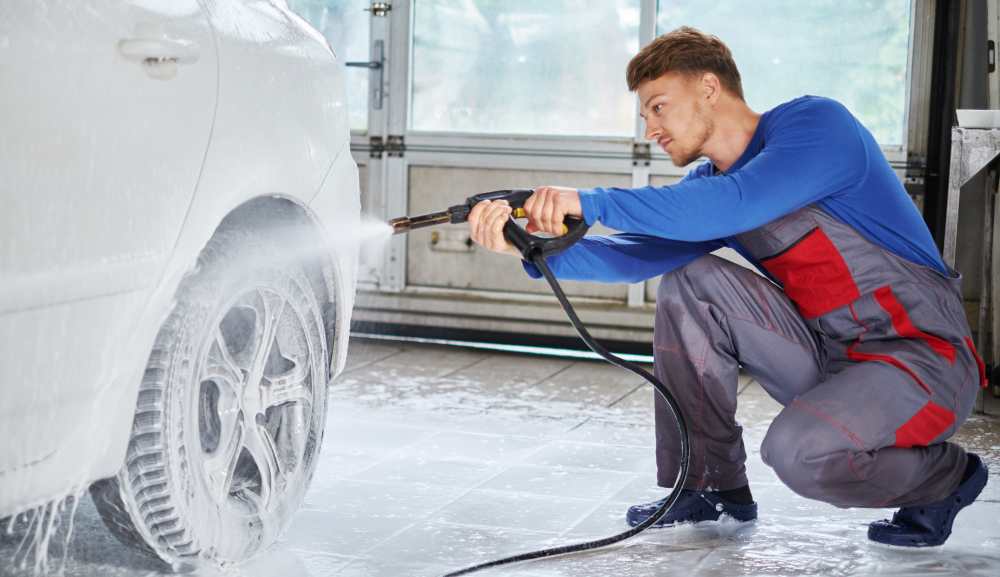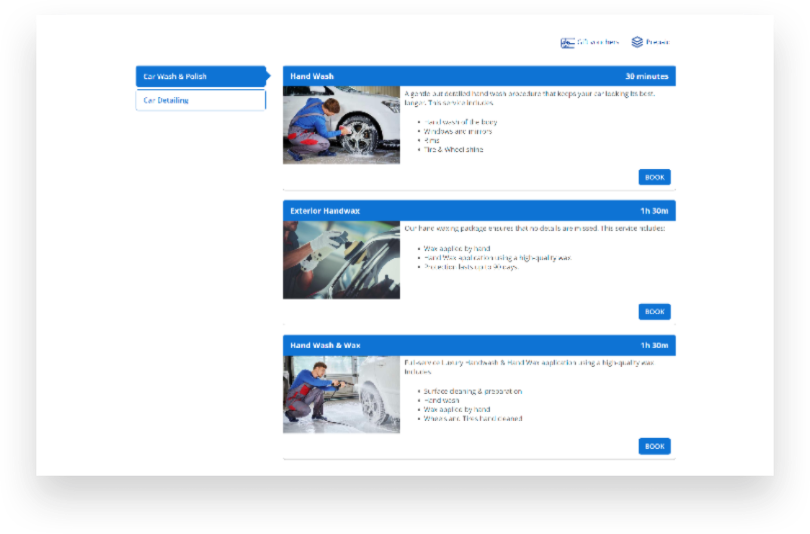
How to Start a Car Service Business in 2025
A car service business, often called an auto (from automotive) repair business, can be a lucrative business operation with a lot of opportunities to grow.
The concept of the car service business is also pretty simple: you provide vehicle repairs and maintenance services for profit. You can do so by yourself or by employing automobile mechanics, and your target markets can be both consumers and businesses.
You can also expand your services by offering window tinting, car audio installation/maintenance, alarm systems installation, and detailing, among other services related to vehicle maintenance and repairs.
In this guide, we will cover all you need to know about starting a successful car service business, and by the end of this guide, you’d have learned about:
- Planning your car repair shop (and writing a business plan)
- Registering your car service business as a legal entity
- Getting the necessary permits and licenses to start your car service business
- Branding and marketing your car service business
- Establishing a strong online presence for your car service business
And more.
Without further ado, let us begin this guide right away.
Planning your car service business
Before anything else, we’d recommend writing a proper business plan for your car service shop so you’ll have a clear roadmap on how you’ll execute the business.
The business plan will be especially important if you are planning to convince external parties to fund the business (securing bank loans, angel investors, etc.). However, even if you plan to fund the business on your own, the business plan will still be very valuable in helping you achieve success.

When planning your car service shop (and writing the business plan), consider the details below.
The types of services you will offer
Car service businesses can come in many different variations:
- A general auto repair shop that offers general repair and maintenance (i.e., oil changes)
- A specialist repair shop specializing in services like auto body repair, detailing, transmission repair, etc.
- Focusing on specific vehicle brands or models
- An all-in-one repair shop that offers everything (at least most types of services.)
It’s crucial to consider that the specialty tools and machines needed to provide one type of auto service (i..e, transmission repair) can be very expensive. So, if you are planning to start the business with relatively limited capital, it’s typically better to specialize in a single type of service rather than being a jack-of-all-trades. You can always expand and diversify into other service types later.
Location, location, location
A car service business is strictly brick-and-mortar (obviously, you can’t deliver your services online). Thus, whether you can secure an ideal location can literally make or break the business’s chances to succeed.
When choosing a location for your car repair shop, you’ll need to consider several things:
- Your target market. Obviously, you’ll need to be in close enough proximity to your ideal audience.
- Rent/purchase cost. Pretty self-explanatory. Better locations will be more expensive, so you’ll need to find the right sweet spot.
- Size. Some types of auto services will require more space than others. Obviously, larger spaces are harder to find and more expensive.
- Accessibility. Whether the location is easy to find and access, parking space availability, whether it’s easy to access the location via public transportation, etc.
- Visibility. Visible locations will naturally attract more walk-ins, which may help attract more clients.
Choosing the right location will probably be the most important decision you’ll make in planning a car service business. Not only will it be a significant investment, but whether you choose the right location can literally make or break your business. So, carefully do your research and weigh the pros and cons before committing to a location.
Budgeting and funding sources
Assess how much you’ll need in startup capital (upfront costs) and ongoing expenses each month.

Obviously, the actual number can vary depending on the type of car repair business you’re planning to open, scale, location, and other factors. However, a medium-sized auto repair shop would require around $50,000 for both startup capital and recurring expenses, with the following important costs:
Startup capital:
- ASE (Automotive Service Excellence) certifications: $36 one-time registration fee, $45-$95 per certification
- Licenses and permits: $100
- Diagnostic tools: $5,000-10,000
- Hydraulic lift: below $1,000 to $7,000+ per lift
- Mechanic’s tools and equipment: approximately $15,000
Recurring expenses:
- Rent: $2,000-$15,000/month
- Insurance: $5,000/year
- Salary: $46,000 average salary/mechanic
Once you’ve established your budget, the next step is to identify your funding sources, and here you have several options:
- Your own savings
- Loans or investments from family and friends
- Business partners
- Bank loans
- Angel investors
Again, if you are planning to secure outside funding (i.e. a bank loan,) having a well-written business plan will be crucial.
When planning your budget and funding, it’s important to be realistic, both in terms of planning the budget and projecting your potential revenue. There’s no use in having a seemingly perfect financial projection if you can’t deliver on your promises.
Competitive analysis
It’s simply impossible to have a successful business—in any niche—if you don’t know who you are competing with.
Before you start your car service business, you should be aware of who your competitors are and understand their strengths and weaknesses.
Fortunately, today performing a competitive analysis is relatively easy (and much cheaper) thanks to the internet and social media. Look them up online, and check online reviews about them on relevant platforms. Also, monitor social media conversations mentioning them.

Once you’ve collected and analyzed enough data from your competitors, you can either aim to imitate them or find opportunities to beat them elsewhere.
Market research
A successful business is one that understands its target market and meets its target audience’s needs and preferences. It’s recommended to conduct a comprehensive market analysis before writing your business plan and starting the business as a whole.
Identifying and understanding your target market will help you in various areas:
- Knowing the potential market size in your area. Will help, for example, in securing funding
- Deciding on the type of car repair service(s) you’ll provide
- Planning how you’ll attract this target audience (marketing plan)
Take enough time to plan every single detail of your car service business, and there’s no need to rush. If necessary, gather input and feedback from relevant people about what you’ve planned so far, but don’t let them cloud your judgment.
Writing the business plan
Now that you’ve planned every important detail about your car service business, it’s time to put these details into a written business plan.
While your business plan should be unique just as your car service business will be unique, here is a basic business plan structure you can follow:
- Cover page. Pretty self-explanatory. Should include the (planned) name of your business, your name as the business (important for securing funding/investment), and contact information
- Executive summary. This section should contain a brief summary of the whole business plan, especially the mission statement, description of the industry, market environment, Unique Value Proposition (UVP), financial projection, and the core team of the business. It’s best to finish this section last after you’ve finished writing the other sections.
- Business overview. An in-depth description of the proposed business. This section should clearly communicate the concept of the business and its value proposition. If the business plan is aimed at securing potential investors or bank loans, this section should be tailored to convince these potential investors or lenders about the business’s value.
- Industry overview. This section should contain the past and current data about the industry you’re going to start the business in (in this case, the car service industry). Describe past and current industry outlook, your competition in the area, barriers of entry, growth potential, and other relevant information.
- Competitive analysis. Identify and describe current and potential competitors. Elaborate on their strengths and weaknesses, as well as the overall outlook for the car service industry in your area. Also, communicate what distinguishes your proposed business from these competitors and your competitive advantage.
- Market research. Elaborate on your target clientele; their needs, preferences, demographics data, and so on. Demonstrate that there is a sizable market for your car service business.
- Core team and management. In this section, you should introduce your team members and describe how this team is going to bring success to your business. Discuss each key management member’s strengths and credentials.
- Operations plan. Describe your day-to-day operations plan and strategies that will support your plan. You may want to leverage the use of tables, graphs, and charts to help elaborate on your strategies.
- Marketing plan. A detailed description of how you are going to sell your car service business and attract your clients. Communicate your clients’ buying behavior and how you are going to leverage various marketing channels to cater to this behavior.
- Financial projection. Describe the current and future projections of your auto repair business’s financial performance. Communicate the capital requirements and your assumptions in terms of financial performance and potential growth. However, make sure every assumption is backed with strong evidence (or expert opinions). If available, include a cash flow statement of your business.
- Appendix. Any attachments and additional documents that can add valuable information to the business plan. You can also include the milestones of your auto repair business.
Obtain required permits and licenses
Most locations would require you to get a business license and specific permits/certifications before you can start providing mechanic services to your clients.

Failure to do so may subject your business to heavy fines or may even force it to close down, so it’s best to do your homework and make sure to get the right licenses before you start the business.
If you are a US-based business, most states would require you to obtain a car shop license, and since a car repair shop operates out of physical locations, having a Certificate of Occupancy (CO) is typically required. A CO essentially proves that all safety regulations have been met by the property and are fit for people to visit/work in.
If you plan to lease a location (i.e. a garage,) then it’s generally the landlord’s responsibility to obtain a CO. So, make sure to confirm whether your landlord had or can obtain a valid CO before committing to a lease.
Learn more about what types of licenses and permits you are legally required to get in your state by visiting the Small Business Administration’s guide to state licenses and permits.
Also, your car repair business must always comply with relevant environmental regulations (both state and federal levels).
Obtain business insurance
Most locations would legally require your auto repair business to be insured before you can operate lawfully.
However, even if it’s not a legal requirement, we’d recommend getting the relevant insurance for your business anyway to protect the business’s well-being in the event of a covered loss.

There are various types of insurance policies that can benefit a car service business, but two are generally the most important:
- General liability insurance: a common coverage protecting businesses from claims involving property damage and/or bodily injuries resulting from your services or operations.
- Workers’ compensation insurance: you’ll need this insurance if you have at least one employee (which is virtually guaranteed for an auto repair shop.)
Branding and marketing
To make sure your potential clients can be aware of and recognize your car service business, it’s important to establish a strong branding, and here are some actionable tips:
- Choose a unique name that is easy to pronounce and remember. Make sure your people can easily understand what types of auto service you are providing from your name (i.e., XXX auto detailing shop)
- Create a logo that supports your brand name. A distinctive logo that is easy to remember works best
- Consistency is key. Use your branding element every chance you can promote your business
Another important aspect of branding is to provide unique offerings that can help make your business distinguishable from your competitors. For example, if you are the only car repair shop within a certain radius that offers alarm installation, then it can be a great thing to emphasize when marketing your business.

Leverage various marketing channels when marketing your business. Marketing your business on social media is a fairly obvious approach nowadays, but you can also leverage more traditional channels like advertising in local newspapers and magazines.
Look for opportunities to partner with other businesses that you can cross-promote with, and you may want to partner with businesses like taxi or limousine service companies that may need the services of reliable car service companies in the same location. These can be a regular stream of revenue for your business.
Establish a strong digital presence
Even if the car service business is a brick-and-mortar business mainly targeted to local clientele, in this digital age, it’s very important to establish a strong online presence to build awareness and attract potential clients.
If your target market can’t find you online, and if nobody mentions your brand on social media, then in their perception, your business doesn’t exist.
With that being said, you should aim to establish a strong online presence in at least the following areas:
- Professional website and landing pages
We can’t deny the importance of a well-designed and fully-functional website in this digital age. For a brick-and-mortar business like an auto repair shop, a website is the equivalent of a digital storefront and online business card, and it’s often going to be the first impression a prospective customer would have on your brand.
Fortunately, with platforms like Wix, Squarespace, and even the handy (and free) WordPress, building a professional website is now much more accessible and affordable. This means there’s simply no reason not to have one.
Depending on the services you’re going to provide, your target audience, and other factors, you may also want to build additional landing pages for your services.
To be effective, your business website should be:
- Optimized for mobile devices. Test on as many devices with different screen sizes as possible. If you use templates (i.e., WordPress Themes,) use mobile-responsive templates.
- Optimized to load fast, leverage Google’s PageSpeed Insights to assess your site’s speed performance
- Informative – contains all the relevant information about your car service business
- Easy to use and navigate, has a reliable online appointment booking function (more on this later)
- 24/7 online booking/appointment
The global COVID-19 pandemic has forced many people to adopt the digital lifestyle, and one of the results is the general consumers’ expectation for reliable 24/7 online booking functions for service businesses—including car service businesses.
Consider the fact that nowadays, more and more people are booking their appointments outside business hours and/or during the weekends/holidays, so if you don’t make online booking available on your website and social profiles, you are simply going to miss out on a significant chunk of potential clients.
 Fortunately, it’s now very easy and affordable to add an online appointment function to your website.
Fortunately, it’s now very easy and affordable to add an online appointment function to your website.
Bookeo’s car washing booking software, for example, offers a fully-functional online booking system at just $14.95/month. You can use Bookeo’s WordPress scheduling widget or use Bookeo’s standalone (brandable) booking page. You can then paste your booking page URL into your social profiles, email signature, or even business cards.
- Social media presence
With the majority of our potential clientele being active on social media, it’s fairly obvious that you should build a strong presence and promote the car service business on relevant social platforms: Facebook, Instagram, Twitter, and so on.
Leverage the three potential channels:
- Organic: building your social profiles by regularly posting relevant/valuable content and growing the number of followers. The most affordable option (and can be totally free,) but it will take some time before you can grow a sizable number of followers and attract more clients to your business
- Paid: leveraging paid advertising/promotion options offered by the respective social network, like Facebook/Instagram Ads. It can guarantee quick results in attracting potential clients but can be very expensive if not managed well.
- Influencer: partner with relevant influencers (i.e., in the automotive niche) so they can help promote your service to their audience. Can be effective, provided you can get the right influencers to work together with.

With how saturated social networks are and the fact that virtually everyone is promoting their businesses on social media, it’s important to be creative and consistent in your social media marketing efforts, or else you’ll drown amidst all the noise.
- Google Maps
As a local business, having a prominent presence on Google Maps is crucial for your car service business.
Today’s clients will use Google Search for phrases like “auto repair near me” or “car service in (city name)” when they are looking for a car service business in their area, and for such keywords, Google will pull results from Google Maps.
You can optimize your Google Maps ranking via local SEO, which can be achieved in four basic steps:
- Claiming and verifying your Google Business listing
- Optimizing your listing. You can optimize for relevant keywords but focus on providing complete and relevant information for potential clients
- Build local citations by listing your business on relevant online directories. The more, the merrier, but make sure to use consistent information, especially NAP (Name, Address, Phone Number.)
- Encourage existing customers to leave (positive) reviews on Google Maps, but also on other relevant review sites and platforms.
Wrapping Up
While a car service business can be a lucrative business opportunity with a lot of potential for growth, it doesn’t mean it’s guaranteed to be successful right away as you start the business.
You’ll still need proper planning and proper execution of your plan in order to achieve success, and in practice, it can be easier said than done.
The tips and strategies we’ve shared above can give you a solid foundation on how to start and run a successful car service business, but above anything else, it’s about providing unique value to your target clientele that’s not offered by your competitors.

